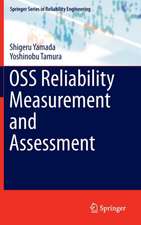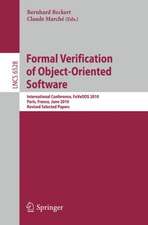Software Reliability Modeling: Fundamentals and Applications: SpringerBriefs in Statistics
Autor Shigeru Yamadaen Limba Engleză Paperback – 6 noi 2013
Part 1 of this book introduces several aspects of software reliability modeling and its applications. Hazard rate and nonhomogeneous Poisson process (NHPP) models are investigated particularly for quantitative software reliability assessment. Further, imperfect debugging and software availability models are discussed with reference to incorporating practical factors of dynamic software behavior. Three software management problems are presented as application technologies of software reliability models: the optimal software release problem, the statistical testing-progress control, and the optimal testing-effort allocation problem.
Part 2 of the book describes several recent developments in software reliability modeling andtheir applications as quantitative techniques for software quality/reliability measurement and assessment. The discussion includes a quality engineering analysis of human factors affecting software reliability during the design review phase, which is the upper stream of software development, as well as software reliability growth models based on stochastic differential equations and discrete calculus during the testing phase, which is the lower stream. The final part of the book provides an illustration of quality-oriented software management analysis by applying the multivariate analysis method and the existing software reliability growth models to actual process monitoring data.
Din seria SpringerBriefs in Statistics
-
 Preț: 378.34 lei
Preț: 378.34 lei - 15%
 Preț: 459.93 lei
Preț: 459.93 lei - 17%
 Preț: 359.75 lei
Preț: 359.75 lei -
 Preț: 411.54 lei
Preț: 411.54 lei -
 Preț: 445.88 lei
Preț: 445.88 lei -
 Preț: 445.33 lei
Preț: 445.33 lei -
 Preț: 378.71 lei
Preț: 378.71 lei -
 Preț: 375.23 lei
Preț: 375.23 lei -
 Preț: 378.71 lei
Preț: 378.71 lei -
 Preț: 350.50 lei
Preț: 350.50 lei -
 Preț: 378.54 lei
Preț: 378.54 lei -
 Preț: 378.71 lei
Preț: 378.71 lei - 15%
 Preț: 461.73 lei
Preț: 461.73 lei -
 Preț: 352.28 lei
Preț: 352.28 lei -
 Preț: 378.54 lei
Preț: 378.54 lei -
 Preț: 377.73 lei
Preț: 377.73 lei - 5%
 Preț: 360.70 lei
Preț: 360.70 lei -
 Preț: 351.42 lei
Preț: 351.42 lei -
 Preț: 378.92 lei
Preț: 378.92 lei -
 Preț: 375.07 lei
Preț: 375.07 lei -
 Preț: 342.74 lei
Preț: 342.74 lei -
 Preț: 444.35 lei
Preț: 444.35 lei -
 Preț: 414.42 lei
Preț: 414.42 lei - 15%
 Preț: 462.70 lei
Preț: 462.70 lei -
 Preț: 378.54 lei
Preț: 378.54 lei -
 Preț: 378.12 lei
Preț: 378.12 lei -
 Preț: 271.46 lei
Preț: 271.46 lei -
 Preț: 347.71 lei
Preț: 347.71 lei -
 Preț: 377.73 lei
Preț: 377.73 lei -
 Preț: 270.74 lei
Preț: 270.74 lei -
 Preț: 378.54 lei
Preț: 378.54 lei - 5%
 Preț: 327.04 lei
Preț: 327.04 lei -
 Preț: 377.18 lei
Preț: 377.18 lei -
 Preț: 273.40 lei
Preț: 273.40 lei -
 Preț: 377.18 lei
Preț: 377.18 lei -
 Preț: 379.30 lei
Preț: 379.30 lei -
 Preț: 376.59 lei
Preț: 376.59 lei -
 Preț: 379.68 lei
Preț: 379.68 lei -
 Preț: 272.04 lei
Preț: 272.04 lei -
 Preț: 378.54 lei
Preț: 378.54 lei -
 Preț: 379.09 lei
Preț: 379.09 lei -
 Preț: 446.26 lei
Preț: 446.26 lei -
 Preț: 375.84 lei
Preț: 375.84 lei -
 Preț: 344.14 lei
Preț: 344.14 lei -
 Preț: 377.95 lei
Preț: 377.95 lei -
 Preț: 269.71 lei
Preț: 269.71 lei - 5%
 Preț: 361.06 lei
Preț: 361.06 lei -
 Preț: 375.84 lei
Preț: 375.84 lei -
 Preț: 442.62 lei
Preț: 442.62 lei
Preț: 348.72 lei
Nou
Puncte Express: 523
Preț estimativ în valută:
66.75€ • 72.53$ • 56.11£
66.75€ • 72.53$ • 56.11£
Carte tipărită la comandă
Livrare economică 16-22 aprilie
Preluare comenzi: 021 569.72.76
Specificații
ISBN-13: 9784431545644
ISBN-10: 4431545646
Pagini: 100
Ilustrații: X, 90 p. 60 illus.
Dimensiuni: 155 x 235 x 12 mm
Greutate: 0.15 kg
Ediția:2014
Editura: Springer
Colecția Springer
Seria SpringerBriefs in Statistics
Locul publicării:Tokyo, Japan
ISBN-10: 4431545646
Pagini: 100
Ilustrații: X, 90 p. 60 illus.
Dimensiuni: 155 x 235 x 12 mm
Greutate: 0.15 kg
Ediția:2014
Editura: Springer
Colecția Springer
Seria SpringerBriefs in Statistics
Locul publicării:Tokyo, Japan
Public țintă
GraduateCuprins
Chapter 1 Introduction to Software Reliability Modeling and Its Applications.- 1. Introduction.- 2. Definitions and Software Reliability Model.- 3. Software Reliability Growth Modeling.- 4. Imperfect Debugging Modeling.- 4.1 Imperfect debugging model with perfect correction rate.- 4.2 Imperfect debugging model with introduced faults.- 5. Software Availability Modeling.- 5.1 Model description.- 5.2 Software availability measures.- 6. Application of Software Reliability Assessment.- 6.1 Optimal software release problem.- 6.2 Statistical software testing-progress control.- 6.3 Optimal testing-effort allocation problem. Chapter 2 Recent Developments in Software Reliability Modeling.- 1. Introduction.- 2. Human Factor Analysis.- 3. Stochastic Differential Equation Modeling.- 4. Discrete NHPP Modeling.- 5. Quality-Oriented Software Management Analysis.
Recenzii
“This book provides a good introduction to the field with pointers to more in-depth material. Those who want to learn more on the subject of software reliability modeling will find this book helpful and beneficial.” (Hon Keung Tony Ng, Technometrics, Vol. 57 (2), May, 2015)
Caracteristici
Explains fundamentals of software quality/reliability assessment Discusses practical applications of software reliability modeling Presents recent developments in software reliability modeling

















